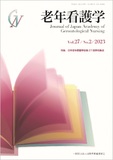Japanese
English
- 販売していません
- Abstract 文献概要
- 参考文献 Reference
抄録
本研究の目的は,急性期病棟に入院した認知障害高齢者が,看護師・看護ケアをどのように受け止めていたかを明らかにすることである.治療後に状態が安定している65歳以上の高齢者で,臨床認知症尺度(CDR)1程度,言語での意思疎通が可能という条件を満たした7人の対象者に半構造的面接を実施し,質的記述的に分析した.
その結果,対象者は,急性期病棟での看護師・看護ケアを,[なじみの看護師の存在や看護ケアに安心する][忙しくても看護師には優しく関わってほしい][忙しい看護師に気を遣い諦める][身体拘束のつらさを感じながらも必要性を理解する][自分の状態がわからないことで看護師に恐怖を感じる]と受け止めていたことがわかった.認知障害高齢者は,看護師の対応を敏感に感じ取っており,個人を尊重した看護ケアを望んでいることが判明した.そのため,急性期病棟で働く看護師は,認知障害高齢者それぞれの状態やニーズを踏まえた個人を尊重した看護ケアを行うことが重要であると考える.
The present study aimed to clarify how older patients with cognitive impairments hospitalized in acute wards perceived nurses and nursing cares. Our participants included 7 older patients 65 years and older in stable condition whose treatment had been completed, whose clinical dementia rating (CDR) was roughly 1, and those who could communicate their wishes verbally. We conducted semi-structured interviews with these participants and analyzed the data using qualitative descriptive methods.
Our participants perceived the nurses and nursing cares in the acute wards as follows: “I feel at peace when a familiar nurse is present or is caring for me,” “Even if they are busy, I would like them to treat me kindly,” “I give up on being polite toward busy nurses,” “While I struggle with the restraints, I understand the need for them,” and “I am fearful toward the nurses because they don’t understand my situation.” Older patients with cognitive impairments responded sensitively to the nurses and their care and revealed that they desired nursing care that valued the individual. Accordingly, nurses who work in acute hospital wards must perform nursing care that respects each individual and responds to each individual’s condition and needs.
Copyright © 2023, Japan Academy of Gerontological Nursing All rights reserved.


